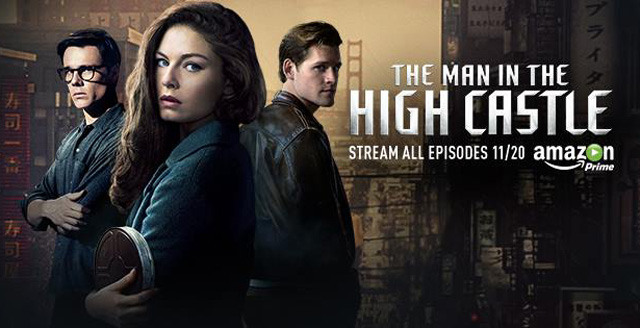Produced by Ridley Scott and Frank Spotnitz, Amazon’s “The
Man in the High Castle,” premiering in its 10-episode entirety this Friday,
November 20th, is the streaming service’s most ambitious drama to
date. While they have received deserved acclaim for their comedies like Jill Soloway’s
breakthrough “Transparent” and the clever import “Catastrophe,” the drama side
of the ledger on Amazon Prime has been lacking, to put it kindly. I enjoyed
parts of “Bosch,” but the crime drama never quite lived up to its potential (I
hope for more in season two). “Hand of God” was nearly unwatchable. With “The
Man in the High Castle,” Amazon proves they can play with the competition
provided by Netflix on a nearly weekly basis. It’s smart, driven, stylish and
creative. “The Man in the High Castle” can be a little cluttered in terms of narrative, but it’s the kind
of challenging program that we haven’t received from Amazon and rarely even
receive from Netflix. Until now.

Based on Philip K. Dick’s 1962 Hugo Award-wining novel, “The
Man in the High Castle” is about an alternative timeline in which the United
States didn’t win World War II. The war ended with the United States being
split in two—Japanese forces taking the West Coast, Germany occupying the
Eastern half of the country, and a neutral zone over the Rocky Mountains in
between. Living under Nazi occupation hasn’t been good for the American spirit.
Free thought is discouraged while a resistance brews underground, trying to
take back the country. As Hitler’s health is rumored to be in decline, the
Resistance sees an opportunity on the horizon. Meanwhile, tension grows between
the German and Japanese halves of the country, one looking for total dominance.
In this fascinating setting, which has been remarkably
well-defined right down to a German influence on architecture and a unique take
on what fashion would be like in 1962 under this regime, we meet Juliana Crain
(Alexa Davalos). In classic noir style, Juliana is handed a film by her sister,
and then watches from the shadows as the sibling is gunned down by Japanese
soldiers. Juliana watches the film, which features footage of the Allied Forces
winning World War II. What happened? Did they really win? Is this an alternate
vision of the future within this already alternate vision of the future? Reportedly
produced by a mysterious man called “The Man in the High Castle,” Juliana seeks
to figure out the source of the film and its intent in inspiring the
Resistance. Leaving behind loyal beau Frank (Rupert Evans), Juliana heads to
the neutral zone, where she encounters the mysterious Joe Blake (Luke Kleintank),
someone who appears to be working for the Resistance but may have ulterior
motives.

“The Man in the High Castle” cleverly flits between the
stories of the people under this German-Japanese banner like Juliana, Frank,
and Frank’s co-worker Ed McCarthy (DJ Qualls), and the power structure of this
universe, including Trade Minister Nobusuke Tagomi (Cary Hiroyuki Tagawa) and
Obergruppenführer John Smith (Rufus Sewell). Tagomi works for the Japanese
Empire in San Francisco, and seems honestly intent on building a better world
out of the occupation of this bountiful country. Smith, on the other hand,
recognizes that the German Empire’s control over the American people is
unlikely to last forever. He’s dangerous and paranoid, knowing that the Resistance
is hiding in the shadows.
The production values on “The Man in the High Castle,”
thanks in no small part to executive producer Ridley Scott, are top-notch; the
best yet produced by Amazon. There’s detail in every corner, down to the “alternate
history” period costumes and truly unique settings that often merge U.S.,
Japanese and German culture. With its noir underpinnings (and casting of Rufus
Sewell), “High Castle” often reminded me of “Dark City,” while also having
elements of the video game series “Fallout” in the way it captures a world that
looks familiar but isn’t exactly our own. There is honest world creation here,
something that is often lacking in even the best programming of “Peak TV,” an
era more defined by its characters than its settings. This makes “The Man in the High Castle” an especially good
fit for binge viewing, as this is a world in which one can be easily
engrossed.

As for the direction of its characters, “The Man in the High Castle” is ambitious
there as well. While I thought I knew where the program was going after
watching the premiere, I was surprised at the show’s willingness to introduce
new supporting characters instead of just sticking with Juliana’s tale of the naïve
girl who ends up inspiring the Resistance. That’s still the heart of the show,
but the writers of “High Castle” are more than willing to “complicate” their
vision, realizing that the show is better if the world Juliana is trying to
save is more completely defined. And a maniacal killer who appears in the third
episode gives the show gravity and danger that it’s arguably missing in the
first two episodes.
“The Man in the High Castle” does sometimes succumb to those
pacing issues that come with ensemble pieces more interested in setting than
narrative. Viewers might get bored, although the cast and creative team always
do a good job of conveying the stakes of this tale; stakes which feel even more current in light of recent events. Just as Juliana seeing an
alternate vision of the future within the show is meant to inspire her, perhaps
we can take a lesson in watching an alternative world in which freedom was destroyed by
fear. With that narrative as crucial as ever in the international scene, “The
Man in the High Castle” is not only Amazon’s best drama, it’s an important one
too.












